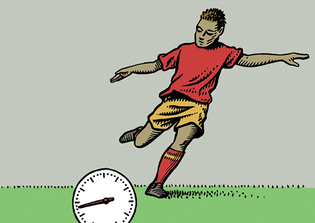 loading
loading
FindingsNoted Gregory NemecView full imageThat score before halftime? Sweet. The world of sports is replete with superstitions. A team that included a Yale professor and a former professional soccer player investigated one of them: if a soccer team scores just before halftime, is it more likely to win? Checking for Alzheimer’s. Not long ago, a confirmed diagnosis of Alzheimer’s was possible only after death, when the brain tissue could be examined for changes that signaled the presence of the disease. Now, Yale has developed a new scanning technology for positron emission tomography (PET). It lets researchers see whether a living patient’s brain cells are well connected, or whether their synapses—connections between brain neurons—have been lost.
The comment period has expired.
|
|